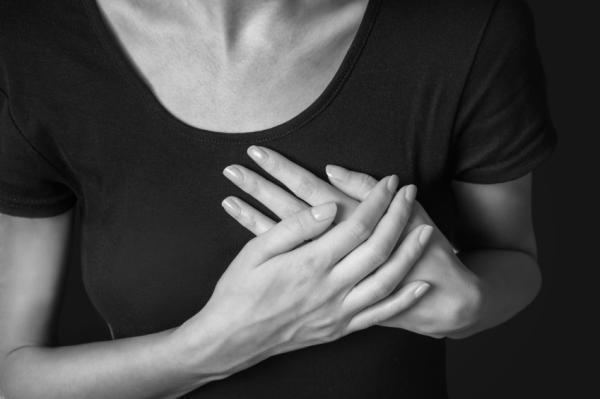Have you ever noticed any punctures or discomfort in the chest area while doing a task that did not require any physical effort? When a person experiences this annoying sensation, usually their first reaction is to think they are having a heart attack or heart attack. However, chest pain can be caused by a multitude of causes, some more serious and others that are not a danger to our health.

If you have suffered this affliction and want to know what could have caused it, in we have the answers to your doubts. Keep reading these lines and find out what are the main causes of chest pain. Even so, if this discomfort is accompanied by more serious symptoms, it is recommended that you go to the health personnel for a better diagnosis.
Cardiovascular Causes of Chest Pain
Chest pain can be caused by different causes or pathologies, since the origin of the discomfort could be any other organ of our body. In the event that the origin of the discomfort is of a cardiovascular nature, the causes are reduced to those explained below.
Angina pectoris
Angina is chest pain that is caused by poor blood flow from blood vessels to the heart muscle or myocardium. This blood failure of the myocardium usually occurs when the person makes a physical overexertion or in a situation where emotional stress levels skyrocket. When you are in these types of situations, the coronary arteries narrow and, therefore, less blood reaches the heart muscle.
The most common symptom to identify angina is chest pain that can feel like a tightness in the chest, usually in the left area. However, other symptoms such as fatigue, dizziness, shortness of breath and excessive sweating may also occur.
Heart attack
Heart attack or myocardial infarction is a serious condition that is usually caused by a blockage in the walls of the coronary arteries, resulting in a lack of blood flow and oxygen to the heart. Generally, this blockage is usually caused by an excess of cholesterol in the arteries.
The most common symptom to identify a heart attack is chest pain on the left side, which can spread to other areas such as the left arm, neck, jaw and/or back. Myocardial infarction can also have other symptoms such as dizziness, palpitations, excessive sweating, anxiety, and shortness of breath.
Aortic dissection
It consists of a rupture in the walls of the aorta, the main artery that moves blood from the heart to the other organs. The main symptoms of this serious problem may include the following:
- Acute chest pain, similar to that of myocardial infarction.
- Cold sweating.
- Irregular pulse (usually weak and fast).
- Pallor.
- Anxiety.
- Shortness of breath when we are lying down.
Pericarditis
Pericarditis is an inflammation of the pericardium, which is a fibrous membrane or covering that envelops the entire heart. Swelling of this membrane is usually caused by an infection and the most common symptoms are stabbing chest pain, fever, swelling of the ankles and/or feet, dry cough and fatigue.
Respiratory diseases of chest pain
Although chest pain is usually due to the cardiovascular causes that we have explained above, it can also be caused by the following lung or respiratory problems:
- Pulmonary embolism: Is a blockage in the arteries of the lungs usually caused by a blood clot, air, or fat. In addition to a stabbing chest pain, this problem is also identified by symptoms such as dizziness, wheezing, swelling in the legs, low blood pressure and skin in a purple tone.
- Pneumonia: it is a respiratory disease that is usually caused by an infection, usually of a bacterial type, in the lungs. The most common symptoms are fever, shortness of breath, cough, chills, and sharp chest pain (especially when the person coughs).
- Pleurisy: it is a respiratory condition that consists of an inflammation located in the lining of the lungs and that is usually caused by a viral infection such as pneumonia. The most common symptom of this condition is chest pain when coughing or breathing deeply accompanied by coughing and shortness of breath.
Digestive problems that cause chest pain
Depending on the symptoms that accompany the chest pain, the cause could be among the following digestive problems:
- Gastroesophageal reflux: it is a disease where substances stored in the stomach return to the esophagus causing a rather unpleasant taste in the mouth. This condition can have symptoms such as chest pain, regurgitation, hiccups, pain or irritation in the throat, and nausea.
- Gallstones: These are solid substances, usually composed of cholesterol or bilirubin, that form in the gallbladder. Symptoms may include pain in the right area of the abdomen that may radiate to the chest, yellowish skin, nausea, clay stools, and fever.
- Gastritis: it is an inflammation that occurs in the lining of the stomach and is usually caused by bacterial infections in the stomach or the consumption of certain medications such as aspirin and / or ibuprofen. Although the pain is usually localized in the upper abdomen, it can move to the chest. In addition, you also have other symptoms such as vomiting, lack of appetite and very black stools.







